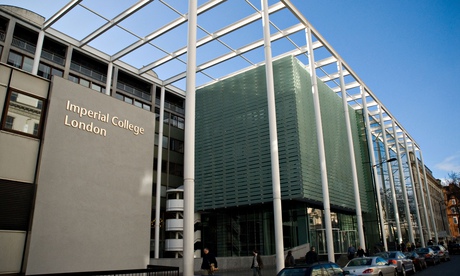UK University
 Imperial College London
Imperial College London
An overview of admission requirements of Imperial College London

INTRODUCTION
Background
● Established in 1907, became independent from the University of London in 2007.
● Eight campuses in and around London, main campus is in South Kensington, central London.
● Strong emphasis on the application of science, engineering and medicine to real world challenges, meaning that courses include a high amount of practical work.
● World class scholarship, education and research with particular regard to their application in industry, commerce and healthcare.
● Breakthroughs include the discovery of penicillin, the development of holography and the foundations of fibre optics, to name just a few.
Facts
◆ Approximately 15,000 undergraduate.
◆ 28% of students are from outside the European Union, from more than 126 countries.
◆ 3 main faculties : Engineering, Natural Sciences and Medicine.
◆ 2 academic schools : Imperial College Business School and Centre for Co-Curricular Studies.
◆ Over 40 departments, institutes and research centres.
The Centre For Co-Curricular Studies provides elective subjects and language courses outside the field of science, wide range of topics including philosophy ethics in science and technology, history, modern literature and drama, art in the 20th century, film studies.
* Part-time Executive MBA ranked 4thin Europe
Others
* Subjects in engineering, life sciences and medicine are ranked within top 10 in the world, within top 5 in Europe.
(Please check for detail ranking of each specific subject of your interest)
Alumni
16 Nobel laureates so far, 5 for medicine, 6 for physics, 5 for chemistry.
Notable academia :
※ Thomas Henry Huxley - biologist
※ Tom Kibble - co-discoverer of Higgs Boson
※ Sir Edward Frankland - originator of the theory of chemical valency
※ Sir William Crookes - discoverer of thallium and inventor of the Crooke's tube
※ Harold Hopkins - optics pioneer
※ Meghnad Saha - mathematician and astro-physicist
※ Donaldson - mathematician and Fields Medallist
and many more.
Other notable alumni:
※ H. G. Wells - author
※ Sir Alexander Fleming – discoverer of penicillin
※ Emma Townshend - writer/journalist
※ Julius Vogel - former Prime Minister of New Zealand
※ Narinder Kapany (PhD Physics 1955) – father of fibre optics
※ Cecil Balmond – architect for CCTV Building in Beijing.
※ Nicholas Tombazis - Ferrari's Chief Designer
※ Andreas Mogensen - first Danish astronaut (European Space Agency).
※ Cyrus Mistry - Chairman-elect of Tata Group.
※ Brian May - guitarist of rock band Queen
※ Aarif Rahman - Hong Kong singer-songwriter and actor
※ Jessica Hsuan - TV actress in Hong Kong.
ADMISSION
Average undergraduate applications to admissions ratio was approximately 6 to 1.The overall acceptance rate to degree programmes (undergraduate and post-graduate) has consistently been below 20%.
Basic Requirements
● Range from A*A*A to AAB at A level, or equivalent qualification, depending on the course.
● Engineering and physics courses requiring an A* in Mathematics.
● In 2008, it was exploring the possibility of entrance exams to help select the most suitable students.
● Since then, it has been reviewing and piloting a range of assessment approaches, such as subject-specific tests, skill tests and motivation-based tests as part of enhanced interviews.
● Closing date for applications is 15 October before the year of admission.
English Proficiency
● GCSE: grade B in English Language.
● IELTS: an overall score of 6.5, with 6 in the Writing and Speaking modules.
● TOEFL Internet-Based Test: an overall score of 85, with 22 in Writing and 23 in Speaking.
Number of Asian students in 2014 (approx.):
* China – 654
* Singapore - 380
* Hong Kong - 330
* Malaysia - 310
* Thailand - 70
Ranking
World
* QS World Ranking 2013/2014 : 5th
* THE Rankings 2013/2014 : 10th
* ARWU 2013/2014 : 24th
UK
* QS Ranking : 3rd
* THE Ranking : 3rd
* ARWU Ranking : 4th
* The Guardians : 9th
* Times/Sunday Times : 5th
The Business School
* Within top 20 in Europe by Financial Times
* World top 10 for entrepreneurship
* Full-time MBA ranked 17thin Europe by Financial Times
ADMISSION
Average undergraduate applications to admissions ratio was approximately 6 to 1.The overall acceptance rate to degree programmes (undergraduate and post-graduate) has consistently been below 20%.
Basic Requirements
● Range from A*A*A to AAB at A level, or equivalent qualification, depending on the course.
● Engineering and physics courses requiring an A* in Mathematics.
● In 2008, it was exploring the possibility of entrance exams to help select the most suitable students.
● Since then, it has been reviewing and piloting a range of assessment approaches, such as subject-specific tests, skill tests and motivation-based tests as part of enhanced interviews.
● Closing date for applications is 15 October before the year of admission.
English Proficiency
● GCSE: grade B in English Language.
● IELTS: an overall score of 6.5, with 6 in the Writing and Speaking modules.
● TOEFL Internet-Based Test: an overall score of 85, with 22 in Writing and 23 in Speaking.
● TOEFL Paper-Based Test: an overall score 600, with 4.5 in Writing.
(For further details on other certificates in English and A level subjects, please consult your agent.)
Career
Average starting salary is the second highest of any UK university.
Ranked top 10 most-welcome university on global job market by New York Times.
For further details and assistance, please email to info@education-ladder.com
© 2014 Education Ladder
STUDY
Life
Some undergraduate courses are required to undertake vacation work or fieldwork away from College as a compulsory and integral part of their courses.
The compulsory work may take the form of paid employment; such payment is usually sufficient to cover all expenses including board, lodging and travel.
In engineering departments, periods of industrial training are a planned and integral part of the course.
Accommodation
◆ Typical annual cost of university/college accommodation : £4,000–£6,500
◆ Typical annual cost of private accommodation :
£4,700–£7,500
◆ Other costs for food, utility, land transport, books and other expenditures are estimated to be £7,000 per year, excluding start-up cost for international students upon arrival.
Fees
Average fee is £9,000 per year, lowest may be £7,800 per year.
(Please consult your course consultant if any to estimate or ascertain the fee for the specific subject and course intended to apply, among other matters like accommodation and application)
University College London (UCL)
Background Founded in 1826, England's third oldest university, first university institution to be founded in London, satellite campuses in Adelaide, Australia. Located in the
Read MoreQuick guide for admission requirements at Imperial College London
Background Established in 1907, became independent from the University of Lond
Read MoreEuropean Higher Education Fair 2014
Each year, over 450,000 international students from 200 nations study at universities, colleges and higher education (HE) institutions in the UK. The UK educates the second highest number of intern
Read MoreQuick guide for admission requirements at London School of Economics and Political Science
London School of Economics and Political Science Background Located in the heart of central London, Westminster. Founded by Fabians, Beatrice and Sidney Webb, Graham Wallas and George B
Read MoreUK Admission Requirement
Many parents spend a minimum of HK$300,000 to arrange their kids to study in UK Boarding school in order to pave a better way for them to get admitted to UK university apart from catching up the En
Read MoreStudy in the UK
Although couple of times smaller than United States, in United Kingdom there is also a big scale of colleges and universities. After signing the Memorandum of Understanding between the British and
Read More





